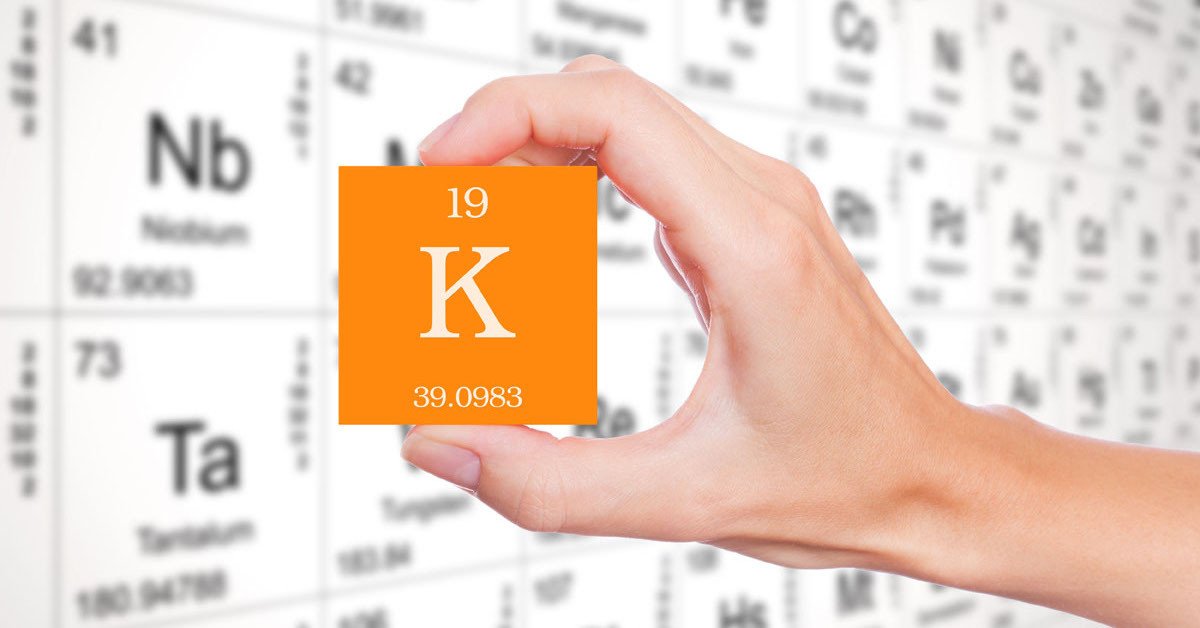What does someone who aggregates health news do when they are sick? Now, I’m not saying what my issue was, let’s just say it wasn’t a pretty picture but… In my case for the first couple of days you are just sick, rather pathetically so… proclaiming “why me? – I eat healthy”, “why me? I take my vitamins and try to make good choices” along with “how can I deal with my puppies when I can’t leave my bathroom”. Then, at some point as symptoms begin to abate and overpowering weakness takes over from the other stuff, your brain is left to wonder if what you know can help you get better. So here it is…
The Power of Potassium
Potassium is the third most abundant mineral in the body. It is important in keeping the body hydrated and for maintaining the electrolyte balance. It is necessary for the function of several organs, including the heart, kidneys, brain and muscular tissues, and works with sodium to support cellular function.
Unfortunately, many children and adults in the U.S and developed nations are suffering from low potassium, ironically this is likely to be due to eating more processed food. The USDA estimates that the dietary intake of potassium by all groups in the U.S. is lower than the daily recommended amount, many adults are not getting even half of the potassium they need!
According to USDA surveys, the median intake of potassium by adults in the U.S is approximately 2.8 to 3.3 grams per day for men and 2.2 to 2.4 grams per day for women, yet the recommended daily amount is 4.7 grams per day.
Potassium is half of our electrolyte system. Our body continuously balances the two electrolytes: potassium and sodium. As sodium levels go up, potassium levels go down, and when sodium levels go down, potassium levels go up. It is particularly important if you are working on lowering your sodium levels where it becomes crucial to keep your potassium intake up.
People at risk for low potassium include:
- Those who take diuretics in order to treat high blood pressure or heart disease
- Anyone who frequently takes laxatives
- Anyone who has recently had an illness that caused vomiting and diarrhea (food poisoning, norovirus, gastric flu, hyperemesis gravidum during pregnancy)
- Those with certain kidney or adrenal gland disorders
- Alcoholics
- People with uncontrolled diabetes
- Athletes or anyone who exercises for an extended period
- Anyone who works or spends long periods outdoors in the heat or cold (heat stroke, exposure, shoveling snow, yard work, homeless)
- Anyone who has suffered dehydration or over hydration
- Anyone on a very low-calorie diet
Just to put that in context, the CDC estimates that each year roughly one in six Americans (or 48 million people) get sick, 128,000 are hospitalized, and 3,000 die of foodborne diseases and that is just one category!
At such times you lose potassium and are unable or unwilling to ingest enough from your diet. (Of course there are more severe forms like dysentery and cholera, which cause the same issue – let’s hope none of us are ever in that situation!)
Your Potassium may also become low due to not eating enough fresh produce. If you are primarily eating out of bags, boxes and packets (aka processed food) you will almost surely have low potassium.
Other people who probably have low levels include those with poor kidney function, increased blood pH and hormone levels as well as those who are on Medications like diuretics and laxatives which can cause potassium levels to drop.
Symptoms and Signs You May Have Low Potassium

Fatigue
Every cell in your body needs the right amount of potassium to function, and a sustained dip can result in generalized fatigue. So if your workout left you exhausted and you know you’re getting enough sleep, potassium might be the reason.
Constipation
Low potassium levels slow down other bodily functions, and your digestive system is no exception
Dehydration
Yes, a side effect of becoming dehydrated is becoming more dehydrated. It’s a cycle and a downward cycle at that.
Muscle Cramps
Potassium plays a role in smooth muscle contractions so when levels are low you may experience aches and spasms.
Blood Pressure Problems
Potassium helps relax blood vessels so without enough, vessels constrict and blood pressure soars – ‘nough said!
Heart palpitations
It’s scary when your heart suddenly skips a beat or speeds up for no apparent reasons. Although there are lots of things that can cause it, potassium is one which you should check.
Other signs include: Severe headache, weight gain, swelling of glands and tissues, cellulite buildup, nausea, abdominal cramping, bloating, abnormal psychological behavior including depression, confusion or hallucinations and irritability are also symptoms of potassium imbalance.
Low Levels Of Potassium Can Cause The Following Issues:
- Increased blood pressure
- Greater risk for heart disease, especially suffering from a stroke
- Increased salt/sodium sensitivity
- Higher risk of kidney stones
- Fatigue and trouble getting good sleep
- Poor concentration and memory
- Higher risk for diabetes and insulin resistance
- Reduced bone formation due to higher levels of calcium being excreted in urine
- Muscle weakness and spasms
- Joint pain
Very low potassium levels - Hypokalemia
Symptoms of hypokalemia are serious, and can even be deadly; they include cardiac arrhythmias, muscle weakness, and glucose intolerance. Usually hypokalemia is caused by factors other than not eating enough food rich in potassium, such as complications due to kidney function, diuretic use, or being very sick and losing fluids.
Where Can You Get Potassium?
Potassium is available from natural food sources including avocado, sweet potato, spinach, acorn squash, wild caught salmon, dried apricots, melon, banana, white beans, and coconut water.
You may also find it in multivitamins or mineral supplements.
Ionic-Fizz™ Magnesium Plus™ contains 100 mg of potassium (from Potassium bicarbonate) along with magnesium, a mineral necessary in potassium ATPase (and another common deficiency in our diets).
Benefits of Potassium

Obviously we want to keep our electrolytes in balance and want to avoid all of those nasties but what else is potassium good for?
- Boost Heart Health - potassium plays a direct role in regulating a healthy heart rhythm. If you have problems with your heart rhythm it may be due to a potassium deficiency. In fact, having a low potassium increases your risk for heart disease and stroke.
- Decreases Muscle Cramps and Improves Muscle Strength
- Reducing Risk of Stroke
- Reducing Risk of Kidney stones
- Alleviates High Blood Pressure (Hypertension)
- Lowers Appearance of Cellulite - Reducing Fluid Retention
- Decreases Excretion of Minerals which tends to ward off Osteoporosis
- Processing Food for Digestion
- Better sleep
- Better concentration
- Healthy Growth
In short, you NEED potassium! You need potassium to feel better but you also need it to survive. Our internal balance is not just important but VITAL, so sick or well you need to make sure you stay in that groove… While you do get it from food you do not get it from the pseudo food we often resort to. So, IF your dietary habits are less than ideal or, if you have any of the issues listed above, supplementing becomes the obvious step. The definition of holistic health means ‘whole body’ health and maintaining balance is the central theme…
Whether you are affected by a one-off illness, which is over, in a couple of days, or you have a lifetime of health challenges or just want to be the best you, you must NEVER stop reading the figurative dials to make sure you are in the right place for optimal life and health.
When I realized I was still languishing there were a number of things I looked to, but there were several my stomach wasn’t ready for (If you have a strong stomach you may find your multi plus some additional potassium gives you enough). I found that I could take Ionic-Fizz™ Super D-K Calcium Plus™ even while I was sick, even before I was ready to take my daily multi vitamin. I really wish I had something like this available when I was pregnant and suffered from severe Hyper Emesis Gravidum (Morning Sickness, which was 24/7 for the whole term). I also like to use this or Ionic-Fizz™ Magnesium Plus™ after exercise and know many active people who use it after sports, or a workout or when feeling dehydrated. Ionic-Fizz™ Magnesium Plus™ is also particularly useful for those on the Ketogenic diet when Ketogenesis starts due to the need for additional Magnesium and Potassium.
Potassium is another necessity I’ve added to my checklist (along with Magnesium) and I must admit I am feeling better for knowing about it and paying attention to my body’s needs – nutrition is not just calories but a way to sustain and fuel your body systems. I bounced back well and am now back to my active lifestyle.
Stay Healthy.
© L.D.S 4.21.2017
The Importance of balancing your body chemistry is supported in the following articles
Health Risks and Disease Related to Salt and Sodium
Beneficial effects of potassium on human health.
Potassium: More Beneficial effects
University of Alabama Birmingham researchers have found that increased dietary potassium levels lessened vascular calcification and aortic stiffness.


Comments
Keeping your blood potassium level in the correct range is important, because this mineral also plays a key role in the function of nerves and muscles, including heart muscle. Your kidneys help regulate potassium levels in your blood.
http://ketodietmealplan.net/